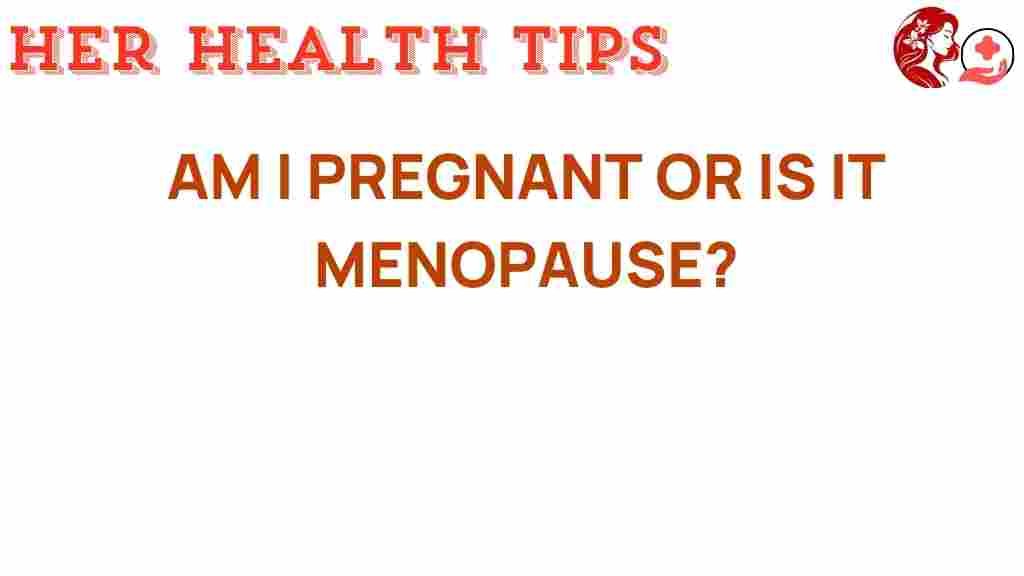Is It Pregnancy or Menopause? Unraveling the Confusion
For many women, the journey through reproductive health can be filled with uncertainty, especially when it comes to understanding the differences between pregnancy and menopause. Both conditions involve significant hormonal changes and can present with overlapping symptoms, leaving many women confused about what they are experiencing. In this article, we will explore the symptoms of pregnancy and menopause, how to differentiate between the two, and what steps to take for accurate diagnosis and health management.
Understanding Pregnancy and Menopause
Pregnancy and menopause are two distinct stages in a woman’s reproductive life, each characterized by unique hormonal changes and symptoms. Understanding these differences is crucial for maintaining reproductive health.
What is Pregnancy?
Pregnancy is the period during which a woman carries a developing fetus in her uterus. It typically lasts about 40 weeks, divided into three trimesters. The hormonal changes during pregnancy are primarily driven by hormones such as:
- Human Chorionic Gonadotropin (hCG): This hormone is produced shortly after conception and is responsible for maintaining the pregnancy.
- Progesterone: Levels of progesterone increase significantly during pregnancy to support the uterine lining.
- Estrogen: This hormone also rises during pregnancy, contributing to various bodily changes.
What is Menopause?
Menopause is the natural biological process marking the end of a woman’s reproductive years, typically occurring between the ages of 45 and 55. During menopause, a woman experiences a decline in the production of hormones like:
- Estrogen: The decline in estrogen levels leads to various symptoms associated with menopause.
- Progesterone: Similar to estrogen, progesterone levels decrease, affecting menstrual cycles.
Common Symptoms: Pregnancy vs. Menopause
Both pregnancy and menopause present a range of symptoms that can sometimes overlap, making it difficult for women to determine which condition they might be experiencing. Here are some common symptoms of each:
Symptoms of Pregnancy
- Missed Period: One of the first signs of pregnancy.
- Nausea: Often referred to as morning sickness, this can occur at any time of day.
- Breast Changes: Tenderness, swelling, and darkening of the nipples.
- Fatigue: Increased tiredness is common in early pregnancy.
- Frequent Urination: As the uterus expands, it puts pressure on the bladder.
Symptoms of Menopause
- Irregular Periods: Changes in the menstrual cycle, including skipped periods.
- Hot Flashes: Sudden feelings of warmth, often accompanied by sweating.
- Night Sweats: Hot flashes that occur during sleep, disrupting rest.
- Vaginal Dryness: Decreased estrogen can lead to dryness and discomfort.
- Mood Changes: Increased irritability or mood swings due to hormonal fluctuations.
How to Differentiate Between Pregnancy and Menopause
Given the symptoms mentioned above, differentiating between pregnancy and menopause can be challenging. Here’s a step-by-step process to help clarify the situation:
Step 1: Assess Your Symptoms
Take note of the symptoms you are experiencing. Consider:
- Are you experiencing a missed period?
- Do you have signs of nausea or breast tenderness?
- Are you noticing irregular periods or hot flashes?
Step 2: Take a Pregnancy Test
If you suspect pregnancy, the most reliable method is to take a home pregnancy test. These tests measure the presence of hCG in your urine. If the test is positive, it is likely you are pregnant.
Step 3: Consult a Healthcare Professional
If you are experiencing symptoms of menopause, or if your pregnancy test is negative but you still have concerns, consult with a healthcare provider. They may recommend:
- Blood tests to check hormone levels.
- Pelvic exams to assess reproductive health.
- Other diagnostic tests as needed.
Health Considerations for Women
Both pregnancy and menopause have significant implications for a woman’s health. Understanding these can help in making informed decisions about reproductive health.
Health During Pregnancy
Maintaining good health during pregnancy is crucial for both the mother and the developing fetus. Key considerations include:
- Regular Prenatal Care: Regular check-ups with a healthcare provider.
- Nutrition: A balanced diet rich in vitamins and minerals.
- Exercise: Safe physical activity as recommended by a healthcare provider.
- Avoiding Harmful Substances: Steering clear of alcohol, tobacco, and certain medications.
Health During Menopause
Women going through menopause should also focus on health management. Important aspects include:
- Managing Symptoms: Discuss treatment options for hot flashes and other symptoms with a healthcare provider.
- Bone Health: Monitor bone density, as the risk of osteoporosis increases after menopause.
- Heart Health: Regular cardiovascular check-ups are essential as the risk of heart disease can rise.
- Mental Health: Pay attention to mood changes and seek support if needed.
Troubleshooting Tips for Common Concerns
Here are some troubleshooting tips for common concerns that arise during pregnancy and menopause:
For Pregnancy Concerns
- If you experience severe nausea, consult a healthcare provider for possible treatments.
- Stay hydrated and eat small, frequent meals to manage nausea.
- Attend all prenatal appointments to monitor your health and the fetus’s development.
For Menopause Concerns
- If hot flashes are disruptive, consider lifestyle changes such as dressing in layers and using fans.
- Discuss with your healthcare provider about hormone replacement therapy (HRT) if symptoms are severe.
- Engage in regular physical activity to improve mood and overall health.
Conclusion
Understanding the differences between pregnancy and menopause is vital for women navigating their reproductive health. Both stages involve significant hormonal changes and can present overlapping symptoms, but with careful assessment and medical guidance, women can effectively manage their health during these transitions. If you are unsure whether you are experiencing pregnancy or menopause, do not hesitate to consult a healthcare professional for a proper diagnosis and tailored advice.
For more information on reproductive health, you can check this resource. Remember, your health is invaluable, and seeking help is always a wise decision.
This article is in the category Reproductive and created by HerHealthTips Team
